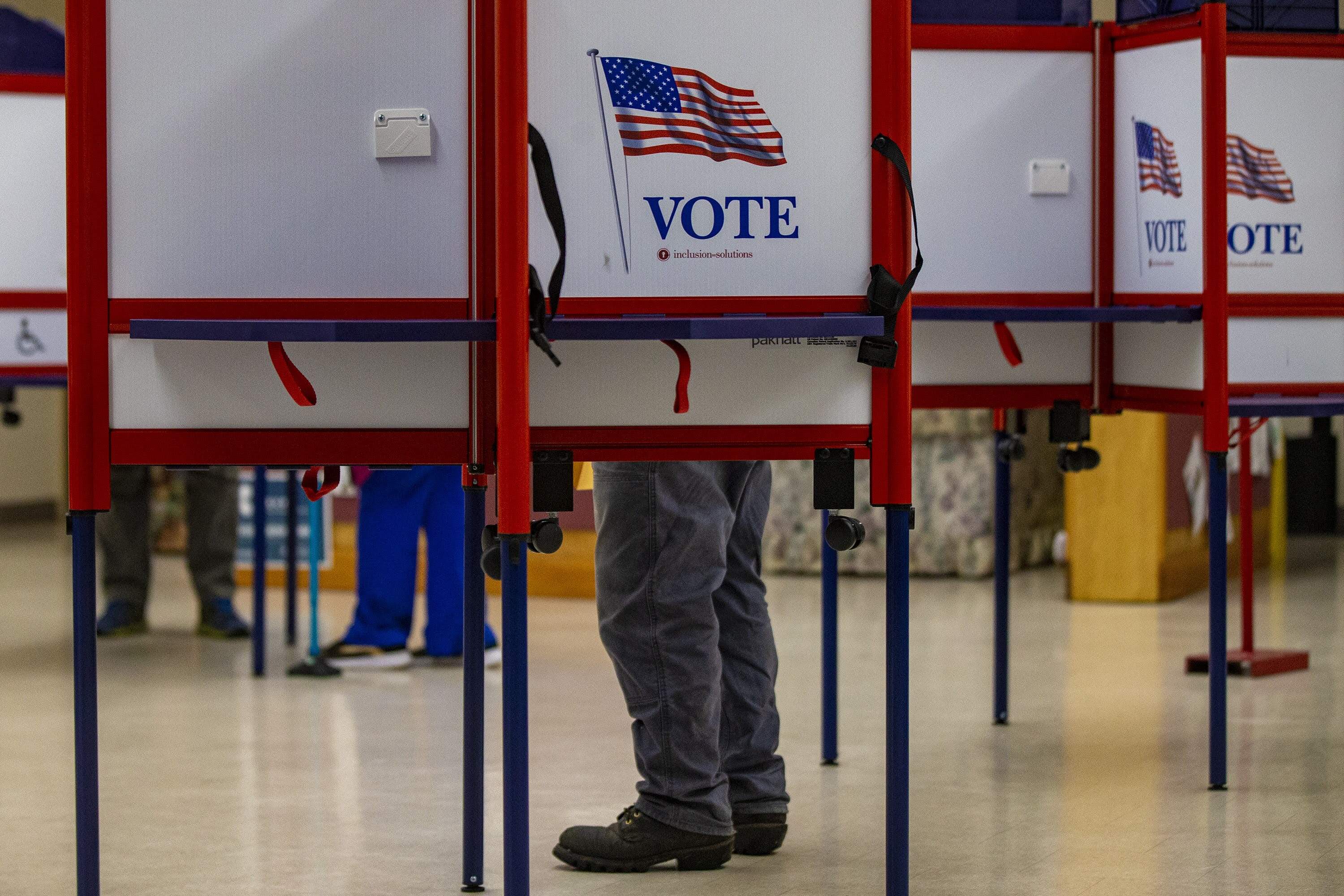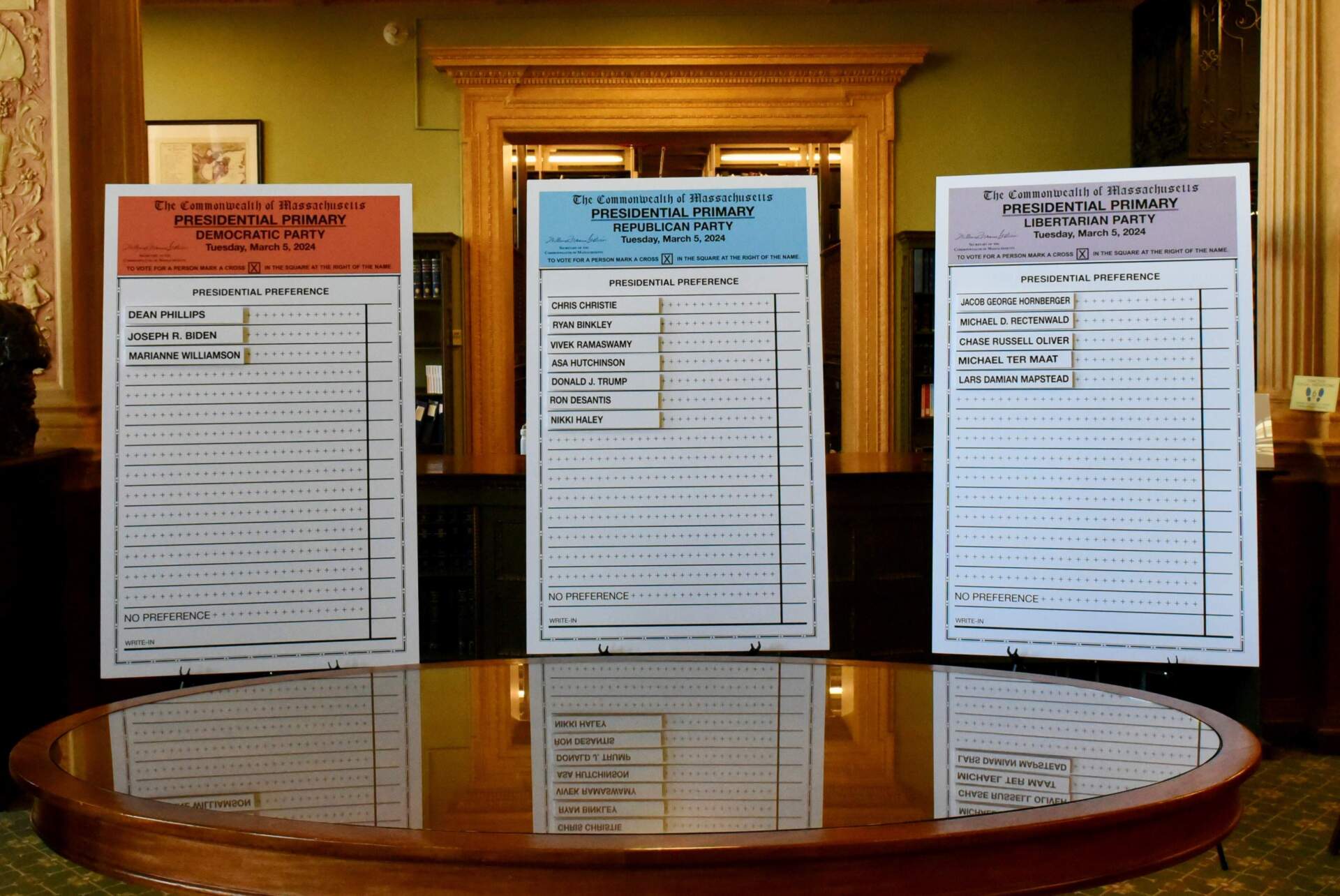Advertisement
Field Guide to Boston
Voter guide: Super Tuesday primary elections in Massachusetts

Super Tuesday, America's busiest day of presidential primaries, is coming up on March 5 — and Massachusetts is one of 15 states (and one U.S. territory) where voters will head to the polls.
In primaries, political parties award candidates a certain number of delegates based on their performance. In the Bay State, 40 pledged delegates are up for grabs in the Republican primary and 92 are at stake in the Democratic race, with former President Donald Trump and incumbent President Joe Biden holding early leads in their respective contests.
Early voting is already underway via mail-in ballots and at early polling places. As of Feb. 28, more than 400,000 voters in Massachusetts have cast their ballots by mail, out of more than 750,000 who requested a mail-in ballot, according the Secretary of State William Galvin's office.
Here's what to know about presidential primary voting in the commonwealth:
Who's on the ballot
Trump and former South Carolina Gov. Nikki Haley are the only major Republicans left in the race. However, a number of candidates who already dropped out — like Vivek Ramaswamy, Chris Christie, Asa Hutchinson and Ron DeSantis — are still on the ballot. Texas businessman Ryan Binkley, who is still running despite winning zero delegates, is also on the ballot.
Based on early primary states, Trump is currently leading the GOP race with 273 delegates, compared to Haley's 43. (To clinch the nomination, at least 1,215 total delegates are needed.) Massachusetts' Republican presidential primary also now uses a "winner-take-all" model, meaning that candidates can win all 40 delegates from the state if they get over 50% of the vote. (They also need at least 11% to get any delegates. FiveThirtyEight's average of recent polls shows Trump with 65% support from GOP voters in Massachusetts, compared to Haley's 29%.
On the Democratic side, incumbent President Joe Biden, U.S. Rep. Dean Phillips and businesswoman Marianne Williamson are on the ballot — Williamson suspended then unsuspended her campaign in February. Biden currently has a 206-0-0 delegate lead over Phillips and Williamson. (Massachusetts' Democratic primary awards delegates proportionately, but candidates have to get at least 15% of the vote to qualify.)
Meanwhile, Libertarians have five choices: Jacob George Hornberger, Michael D. Rectenwald, Chase Russell Oliver, Michael Ter Maat and Lars Damian Mapstead.
There is also a "no preference" option on each ballot, if you're not feeling any of the candidates.
You also might notice that, below the presidential candidate, there are a bunch of candidates for state and town/ward party committee on your ballot. These are not governing officials. Ward or town committee members represent their parties on a local level. Towns and wards can have anywhere from three to 35 committee members in their party. State committee members, broken down on the ballot into Party State Committee Man and Party State Committee Woman, represent the party on the state level.
There's some attention around Massachusetts Republican State Committee races this year, as those members vote to elect (and keep in office) the chairs of the party. Last year, Massachusetts GOP Chairwoman Amy Carnevale beat out incumbent chair Jim Lyons, a Trump ally who held the job for two terms, by just three votes. But as Politico reports, some allies of Lyons are hoping to win enough committee seats back this year, potentially forcing another struggle over the party's leadership.

How to vote
If you're not yet registered to vote, you won't get to vote in the primaries. The deadline to register, update you address, or change party affiliation passed on Feb. 24. If you're unsure if you're registered or don't know where to vote, you can find that information here.
Registered voters have three options for voting in the primary: Mail-in ballots, early voting or voting in-person on primary day.
The deadline to apply to vote by mail is Tuesday, Feb. 27. But at this point, if you haven't already requested a mail-in ballot, Galvin's office strongly encourages voting in person, due to the time it takes to mail your ballot back and forth. Mail-in ballots can be sent back in their provided envelopes, dropped off to local election officials, placed in a drop box or brought to an early voting location (but not a polling place on primary day itself). They're due by 8 p.m. on March 5.
"USPS recommends allowing up to seven days for mail delivery, so anyone who hasn’t mailed back their ballot by [this Tuesday, Feb. 27] should really use a drop box, if possible," Debra O'Malley, a spokesperson for Galvin's office, told WBUR in an email.
Early voting will run through Friday, March 1. There's no special application to vote early. You can find an early polling place and schedule here.
On Super Tuesday, polls will be open from 7 a.m. to 8 p.m. Showing identification is not required to vote unless you are voting for the first time in Massachusetts, are on the inactive voter list, are casting a provisional or challenged ballot or the poll worker has a practical and legal reason to ask for identification. Acceptable forms of ID can be found here.
Who can I vote for?
Massachusetts has what's known as an "open" primary, meaning voters who aren't enrolled in a party (aka independents) can choose at the polls — or on their mail-in ballot application — whether to vote in the Democratic, Republican or Libertarian Primary. But if you're already enrolled as a Democrat, Republican or Libertarian, you can only vote in your party's primary.
This article was originally published on February 26, 2024.


